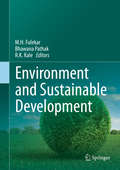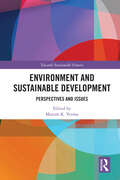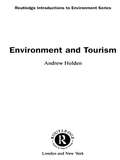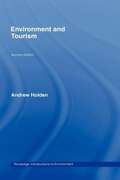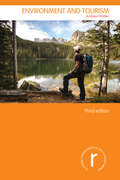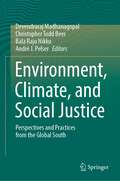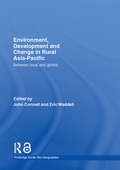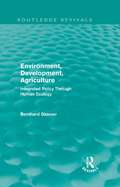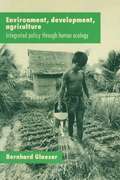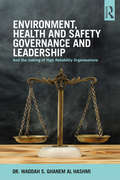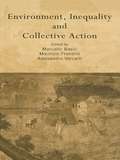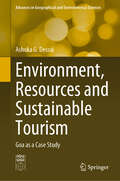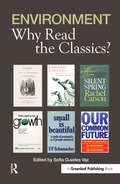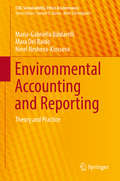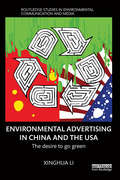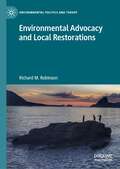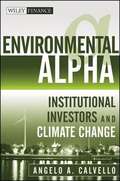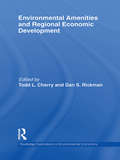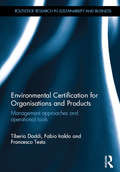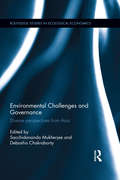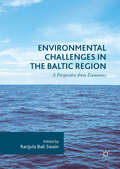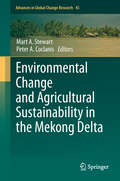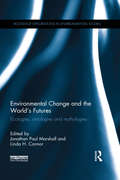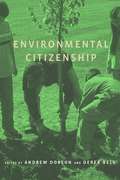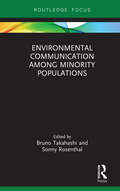- Table View
- List View
Environment and Sustainable Development
by M. H. Fulekar Bhawana Pathak R K KaleGlobal society in the 21st century is facing challenges of improving the quality of air, water, soil and the environment and maintaining the ecological balance. Environmental pollution, thus, has become a major global concern. The modern growth of industrialization, urbanization, modern agricultural development and energy generation has resulted in the indiscriminate exploitation of natural resources for fulfilling human desires and needs, which has contributed in disturbing the ecological balance on which the quality of our environment depends. Human beings, in the truest sense, are the product of their environment. The man-environment relationship indicates that pollution and deterioration of the environment have a social origin. The modern technological advancements in chemical processes/operations have generated new products, resulting in new pollutants in such abundant levels that they are above the self-cleaning capacity of the environment. One of the major issues in recent times is the threat tohuman lives due to the progressive deterioration of the environment from various sources. The impact of the pollutants on the environment will be significant when the accumulated pollutants load will exceed the carrying capacity of the receiving environment. Sustainable development envisages the use of natural resources, such as forests, land, water and fisheries, in a sustainable manner without causing changes in our natural world. The Rio de Janeiro-Earth Summit, held in Brazil in 1992, focused on sustainable development to encourage respect and concern for the use of natural resources in a sustainable manner for the protection of the environment. This book will be beneficial as a source of educational material to post-graduate research scholars, teachers and industrial personnel for maintaining the balance in the use of natural sources for sustainable development.
Environment and Sustainable Development: Perspectives and Issues (Towards Sustainable Futures)
by Manish K. VermaThis volume provides a comprehensive account of the linkages between environment and sustainable development in society from an interdisciplinary perspective. With its case studies from across the world, including countries such as India, Australia, South Africa, Sri Lanka, the United States, Croatia, Italy, Brazil, Japan, and Kenya, it explores critical environmental issues concerning energy justice, queer ecology, mountain cultures, incarceration, energy strategies, mining tourism, pollution control mechanisms, social impacts of oil and gas production, contract farming, gender mainstreaming, climate change, and droughts and adaptation strategies along with literacy, leisure, well-being, development, sexuality, sustainability and environmental education. The book examines several dimensions within global environment of the adverse impact of developmental activities, discusses sustainable development activities undertaken in contemporary times, and underscores the importance of a just, people-centric policy framework in promoting sustainable development. Lucid and topical, this book will be useful to scholars and researchers of environmental studies, development studies, sustainable development, political studies, sociology, and political economy. It will also interest policymakers, development practitioners, NGOs and think tanks working on environment and sustainable development, climate issues and SDGs.
Environment and Tourism
by Andrew HoldenFor many people, holidays are an increasingly central feature of contemporary western society. The tourism industry has expanded rapidly since 1950, but this book poses the significant question of consequent environmental impacts: are environments being benefited or damaged, by the tourist who visit them? A well-balanced introductory text, this topical book on the relationships between tourism, society and the environment, examines 'tourism' and 'environment' in detail, and gives a historical overview of the growth of the tourism industry. It discusses how the tourism industry markets physical and cultural environments to be consumed by the tourist, and the consequences of the tourism they then attract. It explores: * how the economics of tourism can be adopted in a positive way to aid conservation * whether the concept of sustainability can be applied to tourism* provides a critique of the 'new' forms of tourism, that have developed in recent years. An extensive range of international case studies from both the developed and developing world are used to illustrate the theoretical ideas presented, and to aid the student, it includes end of chapter summaries, further reading guides and boxed vignettes focusing on contemporary environmental issues and debates.
Environment and Tourism (2nd Edition)
by Andrew HoldenThis second edition of Environment and Tourism reflects changes in the relationship between tourism, society and the natural environment in the first decade of the new century. Alongside the updating of all statistics, environmental policy initiatives, examples and case studies new material has been added. This includes two new chapters: one on climate change and natural disasters and the other on the relationship between tourism and poverty. These themes have direct relevance, not only to tourism, but are reflective of the wider relationship between nature and society, a thesis that contextualizes this book. Tourism is also analyzed as an interconnected system, linking the environments of where tourists come from, with the ones they go to. Taking a holistic view of the tourism system and how it interacts with the natural environment, this volume illustrates the positive and negative effects of this relationship, and importantly how tourism can be planned and managed to encourage natural resource conservation and aid human development. It is an invaluable tool for all those studying human geography, tourism and environment studies.
Environment and Tourism (Routledge Introductions to Environment: Environment and Society Texts)
by Andrew HoldenThe global demand for tourism continues to increase as economic growth creates opportunities for its consumption as a lifestyle option across cultures. The spatial reach of recreational tourism into remoter environments reflects a desire to reconnect to nature that is partially created by the global trend toward urbanisation. At the same time, anthropogenic created environmental problems have led us to re-evaluate our relationship to nature and the values that are held by the environment. This third edition ofEnvironment and Tourism incorporates additional material on environmental philosophies and ontologies of nature and how these influence our understanding of tourism's relationship with the natural environment. In an epoch representing a critical juncture for the future well-being of the planet based on our relationship to nature, the text has been updated to reflect the growth in significance of the interaction between tourism and the natural environment as a part of this discourse. It communicates a range of key conceptual debates on the ethics and economics of the consuming nature for tourism and relates these to real world examples whilst evaluating environmental planning, and management responses. The book seeks to highlight the relevance of the significance of tourism for nature within the framework of society, as a system of inter-connected places across space and time, exploring the relationship of the environments of where tourists come from with the ones that they travel to. The updated features include: new chapters on philosophies and constructs of the environment, environmental ethics, and tourist consumption an extensive range of international case studies used to illustrate the theoretical ideas presented boxes offering bite sized insights, and think points designed to encourage students to further engage with the topics discussed Environment and Tourismemphasises a holistic view of the tourism system and how it interacts with nature, illustrating the positive and negative effects of this relationship. It emphasises how ontologies of the environment influence the planning and management of tourism for natural resource conservation and human development. It is an invaluable tool for anyone studying Human Geography, Tourism and Environmental Studies, as well as for policy makers and consultants working in the field of tourism development.
Environment, Climate, and Social Justice: Perspectives and Practices from the Global South
by Devendraraj Madhanagopal Christopher Todd Beer Bala Raju Nikku André J. PelserThis book approaches environmental, climate, and social justice comprehensively and interlinked. The contributors, predominantly from the Global South and have lived experiences, challenge the eurocentrism that dominates knowledge production and discourses on environmental and climate [in] justices. The collection of works balances theoretical, empirical, and practical aspects to address environmental and climate justice challenges through the lens of social justice. This book gives voice to scholars of the Global South and uses an interdisciplinary approach to show the complexity of the problem and the opportunities for solutions, making this book a powerful resource in teaching, research, and advocacy efforts. The innovativeness of this approach stems from the use of narratives, scientific explanation, and thematic analysis to present the arguments in each chapter of this edited book. Overall, each chapter of this book acts as a powerful resource in teaching, research, and advocacy efforts. This book fills a gap in the Global South production of environmental, climate, and social justice. It provides in-depth knowledge to the readers and raises their critical thinking about key elements/discussions of justice issues of environmental conflicts and climate change. The book is a useful read to a general audience interested in the topic of climate, environment, and development politics.
Environment, Development and Change in Rural Asia-Pacific: Between Local and Global (Routledge Pacific Rim Geographies #Vol. 6)
by John Connell Eric WaddellThis volume examines the economic, political, social and environmental challenges facing rural communities in the Asia-Pacific region, as global issues intersect with local contexts. Such challenges, from climatic change and volcanic eruption to population growth and violent civil unrest, have stimulated local resilience amongst communities and led to evolving regional institutions and environment management practices, changing social relationships and producing new forms of stratification. Bringing together case studies from across mainland Southeast Asia and the Island Pacific, an expert team of international contributors reveal how communities at the periphery take charge of their lives, champion the virtues of their own local systems of production and consumption, and engage in the complexities of new structures of development that demand a response to the vacillations of global politics, economy and society. Inherent in this is the recognition that 'development' as we have come to know it is far from over. Each chapter emphasizes the growing recognition that ecological and environmental issues are key to any understanding and analysis of structures of sustainable development. Providing diverse multidisciplinary theoretical and empirical perspectives, Environment, Development and Change in Rural Asia-Pacific makes an important contribution to the revitalization of development studies and as such will be essential reading for scholars in the field, as well as those with an interest in Asia-Pacific studies, economic geography and political economy.
Environment, Development, Agriculture: Integrated Policy Through Human Ecology (Routledge Revivals)
by Bernhard GlaeserThis reissue, first published in 1995, focuses on philosophy and social science in human ecology, and includes case studies dealing with the problems of political implementation of development plans and schemes. Part One deals with theory, including a comprehensive introduction to the field and an overview of the conceptual modelling typical in human ecology. Part Two moves towards questions of human behaviour and action, exploring the relationship between environmental ethics and policy in terms of the justification and implementation of human interactions with nature and the environment on an ecologically sustainable basis. In Part Three, the author focuses on environmental policy in China since 1949 and on a regional case study in India. The final part of the book discusses the prospects for sustainable development more broadly, in terms of favouring ecological and cultural variety in agriculture and of viewing the relationship between human beings and the natural environment as a matter of overexploitation rather than crisis.
Environment, Development, Agriculture: Integrated Policy through Human Ecology (Routledge Revivals Ser.)
by Bernhard GlaeserSummarising the democratic experience in modern Western civilisation, this text defines the term and looks at its changing meanings over the past two centuries or so. It records criticisms, and is especially concerned with the conditions that are necessary for democracy to exist.
Environment, Health and Safety Governance and Leadership: The Making of High Reliability Organizations
by Waddah S. Ghanem Al HashmiEnvironment, health and safety (EHS) management has become increasingly important in the past 10 years, especially within high risk and high reliability organizations. EHS is driven from the top of an organization, and whilst there has been much research on the subject of EHS leadership, there is very little on EHS governance and the director’s role in leading or influencing change in organizational safety/EHS performance. Environment, Health and Safety Governance and Leadership: The Making of High Reliability Organizations reviews the factors influencing safety/EHS leadership and governance and addresses all the areas where the role impacts on the performance and sustainability of organizations. Based on the author’s in-depth research, the book draws on much of the best-practice standards developed by many leading organizations such as the UK Health and Safety Executive (HSE), the Institute of Directors (IoD) and the Organisation for Economic Co-operation and Development (OECD). This book provides exclusive insights and legal imperatives for practitioners and leaders to inform decision making, strategy and EHS governance, all of which can have a fundamental impact on business continuity, developing company value and the sustainability of large organizations around the world.
Environment, Inequality and Collective Action (Routledge Siena Studies in Political Economy)
by Maurizio Franzini Alessandro Vercelli Marcello BasiliEfficiency is the hallmark of environmental economics, and though economists are concerned with the environment, primarily because it challenges the efficiency of competitive markets, until now, limited attention has been paid to distributional issues. This excellent collection of essays identifies and addresses key issues surrounding the inequality-environment relationship such as: * Does increasing economic inequality lead to better or worse environmental quality? * Which individual or social features play a role in determining the differentiated impact of changes in the environment? * What impact does economic inequality or social segmentation have on collective action?* How important is the complex economic and social institution in which the inequality-environment takes place? With an impressive array of contributors and an excellent mix of popular and noteworthy topics, this latest addition to the Routledge Siena Studies in Political Economy series will prove essential to economists with an interest in the environment and will be useful to readers with a more general environmental studies background.
Environment, Resources and Sustainable Tourism: Goa as a Case Study (Advances in Geographical and Environmental Sciences)
by Ashoka G. DessaiThis book suggests sustainable economy from the viewpoint of tourism fostering low carbon footprint. Focussed on conserving heritage, culture and endemic biota of a crucial biodiversity hotspot of the world, the book discusses the impact of a large population, fast-paced development and excessive consumption of earth resources by tourism in a developing economy. The book (i) assesses the impact of overexploitation of earth resources on environmental components such as air, water, land and people, (ii) examines the sustainability of tourism on the physical, economic and socio-cultural environment including human lifestyles, (iii) presents the potential of tourism in promoting sustainable development, poverty alleviation and conservation of nature and (iv) formulates recommendations for tourism, fostering sustainable development in Goa, India. The book offers students, researchers, academics and professionals a comprehensive discourse integrating geological and societal perspectives on core issues. It generates critical thinking on the complex issue of sustainable tourism by providing in-depth perspective on peoples of different hues and their role in safeguarding the future of this unique region.
Environment: Why Read The Classics?
by Sofia Guedes VazEnvironment: Why Read the Classics? presents six important essays by some of the world's leading environmental thinkers on six of the most emblematic books ever written on the environment. The books – Walden; A Sand County Almanac; Small is Beautiful; Silent Spring; The Limits to Growth; and Our Common Future – taken together have been hugely important in the development of global environmental awareness, activism and policy. The essayists – Viriato Soromenho-Marques, J. Baird Callicott, José Lima Santos, Tim O'Riordan, Satish Kumar and Marina Silva – invite readers to reflect on these ground-breaking works and examine their historical importance, as well as what they should mean to us today and what relevance they will have to future generations. More than just books about the environment, these are also philosophical treatises, in that they increase our understanding of the natural world and of ourselves, calling us "to weigh and consider", as Bacon put it. In particular, they make us reflect on the need to constantly redefine the purposes of progress, the economy and society. How we relate to nature is a crucial aspect in the plans we make as a species, and as individuals; and every one of these books inspires a more respectful relationship, both with nature and humanity, and consequently with ourselves. The six essays in this book are the result of a series of conferences organised in Lisbon by the Calouste Gulbenkian Foundation with the support of the American Embassy in Portugal. Its *raison d'être* was to revisit the ideas that have shaped the environmental movement, seeking inspiration to deal with what looks like a very challenging future. The significance of such timeless concepts is now more apparent than ever; and these evergreen books are full of ideas that retain their spark even in our difficult times. This is what makes them classics. Environment: Why Read the Classics? is a provocative book and will be essential reading for all those concerned about the state of the world.
Environmental Accounting and Reporting
by Maria-Gabriella Baldarelli Mara Del Baldo Ninel Nesheva-KiossevaThis book discusses the foundations of social and environmental accounting and highlights local differences in countries like Italy and Bulgaria. It also describes the institutional environment, which affects the development and application of environmental accounting and reporting, as a basis for evaluating current achievements and the future steps that need to be taken to develop and spread environmental accounting. The book is unique in presenting exemplary cases from different emerging and developed countries. It is a valuable resource for theorists in the field, practitioners in companies, as well as investors and other stakeholders. Moreover, it provides students with the necessary theoretical constructs, empirical studies as well as practical and managerial tools to allow for a quick orientation in the methodology, techniques and selected practices used in environmental accounting and reporting.
Environmental Advertising in China and the USA: The desire to go green (Routledge Studies in Environmental Communication and Media)
by Xinghua LiSince the late 1980s, green consumerism has been hailed in the West as an efficient solution to environmental problems. However, Chinese consumers have been slow to warm up to eco-friendly products. Consumers prefer SUVs to hybrid cars, health supplements and snake oil medicines to organic foods and eco-fashion is still secluded in high-end designer studios. These choices contradict the findings of many sustainable lifestyle surveys that claim to register a rising desire for green products among the Chinese. This book examines the psycho-cultural differences that disrupt the translation of "eco-friendly" appeals to China by analyzing environmental advertising. It explores the different notions of "green", the structures of desire that underlies the advertisements, and how they are shaped by ideological, cultural, and historical differences. Rather than arguing the superiority of the American or Chinese version of green consumerism, the book interrogates the role of advertising in the global spread of Western ideologies and explores the possibilities for consumers to resist transnational corporate hegemony in the green movement. This book fills an important gap in the critical scholarship on green marketing and should be of interest to students and scholars of environment studies, green advertising and marketing, environmental communication and media studies, China studies and environmental sociology, ethics and cultural studies.
Environmental Advocacy and Local Restorations (Environmental Politics and Theory)
by Richard M. RobinsonThis book explores the leadership of state and federal environmental agencies and local environmental groups in restoring the degraded rivers that flow into North America’s Great Lakes and other sites in the northeastern industrial corridor of the US. Robinson examines twenty of the forty-eight sites included in the Areas of Concern Program of the Great Lakes Water Quality Agreement between Canada and the US. These twenty include heavily urbanized locales such as those along the River Rouge and Detroit River, but also more pristine locales such as the St. Louis River that flows through Duluth. Additionally, Robinson examines challenging river restorations within the northeastern industrial corridor which are led by effective local environmental advocacy organizations: the Penobscot Nation of Indigenous People, the Mystic River Watershed Association, and the Housatonic River Valley Association. All of these river restorations are led and managed by the environmental experts of (i) state and federal agencies, (ii) academia, and (iii) environmental NGOs. Local restorations of industrially degraded water bodies now compose a significant segment of the environmental movement and, ultimately, Robinson demonstrates that local environmental advocacy organizations can help marshal state and local funding for those efforts.
Environmental Alpha
by Angelo CalvelloThe definitive guide to how institutional investors should approach the risks and opportunities associated with climate changeEnvironmental Alpha provides institutional investors with the comprehensive framework they need to assess the risks and investment opportunities tied to climate change.Climate change will present institutional investors with some of the most important risks and opportunities they will face for generations to come. Climate change has the potential to affect many sectors in radically different degrees over time, and institutional investors need to have a thorough understanding of the multi-dimensional risks and opportunities that could influence nearly every investment in their portfolios. This volume is composed of contributions by leading experts in environmental investment, moving beyond the theoretical or academic nature of much of the current discussion on the topic to provide you with real-world insights into an emerging market.Examines the climate change-related drivers of returns (science, economics, policy, and technology) that make environmental alpha possibleExplores fiduciary duty and climate changeContains in-depth explanations of each of the major categories of environmental investing and examines related environmental alpha opportunitiesDiscusses practical implementation issuesPresents real-world case studies and examplesClimate change will be one of the most important investment themes of the next twenty years; the related environmental investment opportunities will provide institutional investors with some of the greatest "alpha" opportunities for years to come. This book will put you in a better position to assess and access these opportunities.
Environmental Amenities and Regional Economic Development (Routledge Explorations In Environmental Economics Ser. #21)
by Todd L. CherryEconomic development and the environment are presumed to be in conflict, but the latter part of the twentieth century experienced a series of economic changes that increasingly questioned this view. Economic activity became more footloose and the ability to attract productive labor became a prominent regional development concern. Consequently, environmental amenities began to have a larger role in determining the patterns of regional growth and development, and subsequently moved to the forefront of current regional economic development thought and practice. Environmental amenities provide non-pecuniary benefits to area residents, and induce in-migration flows to regions that possess high levels of environmental amenities. The attraction is particularly strong for those individuals with higher incomes and wealth. The combined forces of increased demand for environmental amenities and increased spatial flexibility of production has brought environmental amenities to the forefront of current regional economic development thought and practice. Regional economic development policy needs to consider the tradeoffs of attracting firms or people, which requires an understanding of the role the environment plays directly or indirectly in attracting firms and households. This book presents key papers that explore the role of the natural environment in regional economic development. The papers contain critical insights and information for both researchers and practitioners interested in the nexus between environmental amenities and regional economic growth and development. The book covers varied dimensions of this issue, including: the relative importance of amenities in recent variation in regional growth; the role of local infrastructure in promoting amenity-led development; socio-economic distribution concerns and sustainability of amenity-based growth; and the effects of local environmentally protected areas on other economic activities. This book will be of most value to practitioners and academics, specifically related to the areas of environmental economics, regional economic development, local and regional planning, public administration and public policy.
Environmental Certification for Organisations and Products: Management approaches and operational tools (Routledge Research in Sustainability and Business)
by Francesco Testa Tiberio Daddi Fabio IraldoEnvironmental certification is an effective tool for managing the environmental impact of companies, leveraging their competitive capabilities and ensuring their compliance with environmental principles. A growing number of countries across the world are adopting this practice and the growth of new environmental standards – with different scopes, aims and roles – calls for a clear and updated systematization of the issue. This book provides a comprehensive, up-to-date overview of the different environmental certification tools. As well as examining practical methods of implementing the standards for each type of certification, the book discusses their added value from a corporate management perspective. In identifying the most important requirements and standards for the issuing of environmental certification of both products and processes, the book demonstrates how companies can use operational methods to develop an environmental management system or a product certification in practice. Balancing a complete theoretical presentation of the issue with an operational perspective, the book supports the adoption and implementation of environmental certification tools. It will be a valuable resource for professionals as well as students and scholars of environmental management, sustainable business and corporate social responsibility.
Environmental Challenges and Governance: Diverse perspectives from Asia (Routledge Studies in Ecological Economics)
by Debashis Chakraborty Sacchidananda MukherjeeThe economies located in East, South and Southeast Asia have witnessed an interesting growth-sustainability trade-off over the last decades. While growth considerations have paved ways for deepened ties with growing trade-investment waves and increasing population pressure necessitated exploitation of hitherto unutilized natural resources, focus on environmental sustainability has been a recent consideration. The growth impetus still playing a key role in these economies, it becomes imperative that the countries effectively address the key sustainability concerns, e.g. air and water pollution, land degradation, loss of biodiversity, climate change issues like CO2 emissions etc. But how prepared is the governance mechanism of these countries, covering not only the legislative and administrative framework but also involvement of the judiciary, presence of spirited civil society and active engagement of stakeholders in policy-framing dialogues, to rise up to these challenges? The book seeks an answer to this question through the environmental governance mechanism and natural resource conservation policies in three vibrant regions within Asia. A holistic development dimension of sustainable development path emerges, through discussion of policies adopted by developed (Japan, South Korea), upper-middle (China, Malaysia), developing (India, Indonesia, Philippines, Sri Lanka, Thailand) and least developed countries (Bangladesh, Myanmar, Nepal).
Environmental Challenges in the Baltic Region
by Ranjula Bali SwainThis book explores environmental challenges in the Baltic region from an economic perspective. Featuring contributions from regional experts from Nordic, Baltic and Eastern European countries it addresses the response to eutrophication caused by increased loads of nutrients to the sea from agriculture, wastewater, industry and traffic, and cost-effective solutions to reach the Baltic Sea Action Plan (BSAP) targets, set up through the Helsinki Commission (HELCOM). Contributions also explore the environmental impacts of rural landscape change during the post-communist period in the Baltic Sea region and a review of the ex-post evaluations of the costs and benefits generated by Baltic Sea nutrient abatement policies. Public policies towards marine protection, wind power establishment, and attitudes to paying for environmental protection, environmental resilience and the international cooperation in the Baltic region are also discussed.
Environmental Change and Agricultural Sustainability in the Mekong Delta
by Peter A. Coclanis Mart A. StewartThe Mekong Delta of Vietnam is one of the most productive agricultural areas in the world. The Mekong River fans out over an area of about 40,000 sq kilometers and over the course of many millennia has produced a region of fertile alluvial soils and constant flows of energy. Today about a fourth of the Delta is under rice cultivation, making this area one of the premier rice granaries in the world. The Delta has always proven a difficult environment to manipulate, however, and because of population pressures, increasing acidification of soils, and changes in the Mekong's flow, environmental problems have intensified. The changing way in which the region has been linked to larger flows of commodities and capital over time has also had an impact on the region: For example, its re-emergence in recent decades as a major rice-exporting area has linked it inextricably to global markets and their vicissitudes. And most recently, the potential for sea level increases because of global warming has added a new threat. Because most of the region is on average only a few meters above sea level and because any increase of sea level will change the complex relationship between tides and down-river water flow, the Mekong Delta is one of the areas in the world most vulnerable to the effects of climate change. How governmental policy and resident populations have in the past and will in coming decades adapt to climate change as well as several other emerging or ongoing environmental and economic problems is the focus of this collection.
Environmental Change and the World's Futures: Ecologies, ontologies and mythologies (Routledge Explorations in Environmental Studies)
by Jonathan Paul Marshall and Linda H. ConnorClimate change and ecological instability have the potential to disrupt human societies and their futures. Cultural, social and ethical life in all societies is directed towards a future that can never be observed, and never be directly acted upon, and yet is always interacting with us. Thinking and acting towards the future involves efforts of imagination that are linked to our sense of being in the world and the ecological pressures we experience. The three key ideas of this book – ecologies, ontologies and mythologies – help us understand the ways people in many different societies attempt to predict and shape their futures. Each chapter places a different emphasis on the linked domains of environmental change, embodied experience, myth and fantasy, politics, technology and intellectual reflection, in relation to imagined futures. The diverse geographic scope of the chapters includes rural Nepal, the islands of the Pacific Ocean, Sweden, coastal Scotland, North America, and remote, rural and urban Australia. This book will appeal to researchers and students in anthropology, sociology, environmental studies, cultural studies, psychology and politics.
Environmental Citizenship
by Andrew Dobson Derek BellThis book considers the theory and practice of environmental citizenship, the obstacles to its realization, and the opportunities it presents for bringing about environmental and social sustainability.
Environmental Communication Among Minority Populations (Routledge Focus on Environment and Sustainability)
by Bruno Takahashi Sonny RosenthalThere are many current socio-environmental conflicts and problems around the world that affect distinct nationalities, races, or ethnicities. Part of the solution to these issues involves interdisciplinary scholarship to make sense of the communication challenges that are involved. However, current research in this area has lacked clear focus on the ways in which environmental issues are culturally and socially constructed by racial and ethnic minorities. This volume aims to improve our understanding of culturally bounded rationalities across racial and ethnic groups facing environmental challenges, as they relate to the formation of environmental identities, environmental injustice, political activism, public engagement, and media representations, among others. The ideas presented in this book dovetail with the idea that environmental communication scholars and practitioners can effectively intervene to engage ethnic groups that traditionally are not included in decision making or deliberation processes that directly affect their livelihoods. Considering problems such as the siting of industrial facilities, flooding, droughts, climate change, and air and water pollution, this book will be of great interest to students, scholars, and practitioners of environmental communication.
